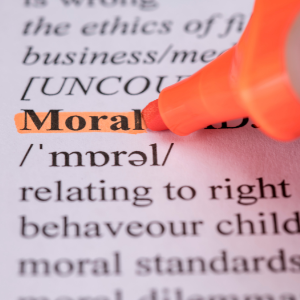Moving From Moral Distress to Moral Resilience Using Acceptance and Commitment Therapy
DOI:
https://doi.org/10.53379/cjcd.2023.350Keywords:
moral distress, moral resilience, acceptance and commitment therapy, career engagement, healthcareAbstract
Moral distress (MD) is a problematic experience for healthcare workers, with career engagement implications including burnout, job turnover, and career turnover. Instances of MD have been increasing since the start of the COVID-19 pandemic, threatening greater problems for the healthcare system. Although a range of interventions have been explored, no evidence-based treatment has been identified. Because of how embedded ethical decision-making is in the healthcare field, it is unlikely that MD will be eradicated; however, it is suggested that MD can be learned from and transformed into moral resilience. Evidence indicates that healthcare workers could benefit from mindfulness-based and emotion regulation skills, alongside values-based and action strategies, to support the development of moral resilience. This article proposes the applicability of Acceptance and Commitment Therapy (ACT) and its six core skills—acceptance, cognitive defusion, mindfulness, self-as-context, values, and commitment—to the work of career practitioners as a means of developing moral resilience skills among healthcare workers and supporting career sustainability.
References
Austin, C. L., Saylor, R., & Finley, P. J. (2017). Moral distress in physicians and nurses: Impact on professional quality of life and turnover. Psychological Trauma: Theory, Research, Practice, and Policy, 9(4), 399-406. https://psycnet.apa.org/doiLanding?doi=10.1037/tra0000201
Campbell, S. M., Ulrich, C. M., & Grady, C. (2018). A broader understanding of moral distress. In C. M. Ulrich & C. Grady (Eds.), Moral distress in the health professions (pp. 59-77). Springer.
Earvolino-Ramirez, M. (2006). Resilience: A concept analysis. Nursing Forum (Hillsdale), 42(2), 73-82. https://doi.org/10.1111/j.1744-6198.2007.00070.x
Flaxman, P. E., Bond, F. W., & Livheim, F. (2013). The mindful and effective employee: An acceptance and commitment therapy training manual for improving well-being and performance. New Harbinger Publications.
Hayes, S. C., Luoma, J. B., Bond, F. W., Masuda, A., & Lillis, J. (2006). Acceptance and Commitment Therapy: Model, processes and outcomes. Behaviour Research and Therapy, 44, 1-25. https://doi.org/10.1016/j.brat.2005.06.006
Hayes, S. C., Levin, M. E., Plumb-Vilardaga, J., Villatte, J. L., & Pistorello, J. (2013). Acceptance and Commitment Therapy and contextual behavioral science: Examining the progress of a distinctive model of behavioral and cognitive therapy. Behavior Therapy, 44(22), 180-198. https://doi.org/10.1016/j.beth.2009.08.002
Helmers, A., Palmer, K. D., & Greenberg, R. A. (2020). Moral distress: Developing strategies from experience. Nursing Ethics, 27(4), 1147-1156. https://doi.org/10.1177/0969733020906593
Hoare, P. N., McIlveen, P., & Hamilton, N. (2012). Acceptance and Commitment Therapy (ACT) as a career counselling strategy. International Journal for Educational and Vocational Guidance, 12(2), 171-187. https://doi.org/10.1007/s10775-012-9224-9
Holtz, H., Heinze, K., & Rushton, C. (2017). Interprofessionals’ definitions of moral resilience. Journal of Clinical Nursing, 27(3-4), e488-e494. https://doi.org/10.1111/jocn.13989
Jameton, A. (1984). Nursing practice: The ethical issues. Prentice-Hall.
Jameton, A. (1993). Dilemmas of moral distress: Moral responsibility and nursing practice. AWHONN’s clinical issues in perinatal and women’s health nursing, 4(4), 542–551.
Lachman, V. D. (2016). Moral resilience: Managing and preventing moral distress and moral residue. Medsurg Nursing, 25(2), 121-124.
Levin, M. E., MacLane, C., Daflos, S., Seeley, J. R., Hayes, S.C., Biglan, A., & Pistorello, J. (2014). Examining psychological inflexibility as a transdiagnostic process across psychological disorders. Journal of Contextual Behavioral Science, 3(3), 155-163. https://doi.org/10.1016/j.jcbs.2014.06.003
Luken, T., & de Folter, A. (2019). Acceptance and Commitment Therapy fuels innovation of career counseling. In N. Arthur, R. Neault, & M. McMahon (Eds.), Career theories and models at work: Ideas for practice (pp.195-205). Ceric.
Lutz, K. T., Amundson, N. E., & Nishikawara, R. K. (2023). Addressing compassion fatigue using career engagement and the Hope-Centered Model for Career Development. Canadian Journal of Career Development, 22(1), 38-47. https://doi.org/10.53379/cjcd.2023.351
Morley, G., Ives, J., Bradbury-Jones, C., & Irvine, F. (2019). What is “moral distress”? A narrative synthesis of the literature. Nursing Ethics, 26(3), 646-662. https://doi.org/10.1177/0969733017724354
Morley, G., Bradbury-Jones, C., & Ives, J., (2021). Reasons to redefine moral distress: A feminist empirical bioethics analysis. Bioethics, 35(1), 61-71. https://doi.org/10.1111/bioe.12783
Musto, L., & Rodney, P. (2018) What we know about moral distress. In C. M. Ulrich & C. Grady (Eds.), Moral distress in the health professions (pp. 9-20). Springer.
Neault, R. A., & Pickerell, D. A. (2019). Career Engagement: A conceptual model for aligning challenge and capacity. In N. Arthur, R. Neault, & M. McMahon (Eds.), Career theories and models at work: Ideas for practice (pp. 271-281). Ceric.
Pavlish, C L., Robinson, E. M., Brown-Saltzman, K., & Henriksen, J. (2018). Moral distress research agenda. In C. M. Ulrich & C. Grady (Eds.), Moral distress in the health professions (pp. 103-125). Springer.
Prudenzi, A., Graham, C. D., Flaxman, P. E., Wilding, S., Day, F., & O’Connor, D. B. (2022). A workplace acceptance and commitment therapy (ACT) intervention for improving healthcare staff psychological distress: A randomized controlled trial. PloS One, 17(4), e0266357-e0266357. https://doi.org/10.1371/journal.pone.0266357
Rushton, C. H. (2016). Moral resilience: A capacity for navigating moral distress in critical care. AACN Advanced Critical Care, 27(1), 111-119. https://doi.org/10.4037/aacnacc2016275
Rushton, C. H. (2017). Cultivating moral resilience: Shifting the narrative from powerlessness to possibility. American Journal of Nursing, 117(2, Suppl 1), S11-S15. https://journals.lww.com/ajnonline/Fulltext/2017/02001/Cultivating_Moral_Resilience.3.aspx
Rushton, C. H., Thomas, T. A., Antonsdottir, I. M., Nelson, K. E., Boyce, D., Vioral, A., Swavely, D., Ley, C. D., & Hanson, G. C. (2022). Moral injury and moral resilience in health care workers during COVID-19 pandemic. Journal of Palliative Medicine, 25(5), 712-719. https://doi.org/10.1089/jpm.2021.0076
Sheppard, K. N., Runk, B. G., Maduro, R. S., Fancher, M., Mayo, A. N., Wilmoth, D. D., Morgan, M. K., & Zimbro, K. S. (2021). Nursing moral distress and intent to leave employment during the COVID-10 pandemic. Journal of Nursing Care Quality, 37(1), 28-34. https://doi.org/10.1097/ncq.0000000000000596
Shoorideh, F. A., Ashktorab, T., Yaghmaei, F., & Majd, H. A. (2015). Relationship between ICU nurses’ moral distress with burnout and anticipated turnover. Nursing Ethics, 22(1), 64-76. https://doi.org/10.1177/0969733014534874
Spilg, E. G., Rushton, C. H., Phillips, J. L., Kendzerska, T., Saad, M., Gifford, W., Gautam, M., Bhatla, R., Edwards, J. D., Quilty, L., Leveille, C., & Robillard, R. (2022). The new frontline: Exploring the links between moral distress, moral resilience and mental health in healthcare workers during the COVID-19 pandemic. BMC Psychiatry, 22(1), 19-19. https://psycnet.apa.org/doi/10.1186/s12888-021-03637-w
Smith-MacDonald, L., Lusk, J., Lee-Baggley, D., Bright, K., Laidlaw, A., Voth, M., Spencer, S., Cruikshank, E., Pike, A., Jones, C., & Bremault-Phillips, S. (2021). Companions in the Abyss: A feasibility and acceptability study of an online therapy group for healthcare providers working during the COVID-19 pandemic. Frontiers in Psychiatry, 12, 801680-801680. https://doi.org/10.3389/fpsyt.2021.801680
Ulrich, C. M., & Grady, C. (2018). Introduction. In C. M. Ulrich & C. Grady (Eds.), Moral Distress in the Health Professions (pp. 1-7). Springer.
Vaklavic, E. A., Stffileno, B. A., & Carlson, E. (2018). Moral distress: Using mindfulness-based stress reduction interventions to decrease nurse perceptions of distress. Clinical Journal of Oncology Nursing, 22(3), 326-332. http://cjon.ons.org/cjon/22/3/moral-distress-using-mindfulness-based-stress-reduction-interventions-decrease-nurse

Downloads
Published
How to Cite
Issue
Section
License
Copyright (c) 2023 Canadian Journal of Career Development

This work is licensed under a Creative Commons Attribution-NonCommercial-NoDerivatives 4.0 International License.














